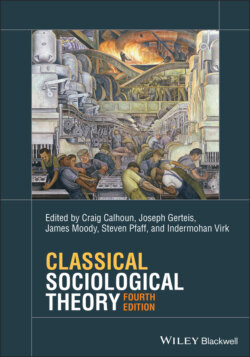Читать книгу Classical Sociological Theory - Группа авторов - Страница 28
The Idea of Society
ОглавлениеOne set of changes had to do with the very idea of society itself. Today, it seems obvious to think society exists and it is important. We may define it as a functional system, the product of meaningful interaction among individuals, or the sum of social institutions. However, although there are debates over its definition, there is a widespread agreement about the importance of the ways in which people are related to each other from love and friendship, family and community to large-scale organizations, such as schools, businesses, and governments to the growing social connections linking the whole world. For society to become the focus of attention and the object of a new science, however, people had to see the world in somewhat different ways.
First, there had to be a separation of the idea of society from government. Early modern thinkers emphasized all the links connecting the members of society to each other, including the culture they shared, the markets in which they exchanged goods, and their communication networks. They distinguished these social relations from control by kings or government officials. This is the basis for the idea of civil society, which remains prominent even today. When we say there is a “civil society” response to an emergency or social problem, we mean that churches and synagogues, non-governmental organizations, and volunteer groups have responded – which are distinct from government agencies. This distinction is rooted directly in the 17th- and 18th-century rise of the idea of society at least partially independent of government.
Second, there had to be an idea that what happened in society was valuable in itself. Early modern thinkers developed the idea that members of society had common interests, that these were morally important, and that social relations should be organized to advance them. Some used the term “commonwealth” to emphasize the connection between the way people were socially organized and their economic productivity and capacity to improve their quality of life. Both sociology and economics grew in part out of this shift in perspective. We see it, for example, in the reading from Adam Smith (and later in that from Émile Durkheim) on the importance of the division of labor. However, the change in perspective was not simply a matter of noticing the importance of social organization, but also a matter of valuing ordinary life. In the Middle Ages, for example, many religious thinkers argued that people should focus only on God, heaven and hell, and salvation, rather than on improving the quality of worldly life. This changed within religious thought as more people looked to the Bible and prayer for guidance in everyday affairs, such as family life. Eventually, theories about this worldly social life became more secular and less theological.
Almost as important, an explicit place for the rights of subjects appeared in political thought, as we saw a shift from the complete rights of kings to the notion that rulers had an obligation to serve the interests of the people they ruled. This was an important basis for the theory that revolution could be just, which was important to the founding of the United States (US) and the transformation of France in the late 18th century. The idea of a social contract traces this shift in thought from Thomas Hobbes to Jean-Jacques Rousseau.
Third, the idea of “the people” had to develop in a new way. For democracy to be possible, for example, it had to be possible for “the people” to express their collective opinions – whether through voting or in other ways, that is, from protest demonstrations to petitions. This required a strong idea of “the people” such as that embodied in the US Constitution, which begins, “We the people of the United States, in order to form a more perfect union, […]” This opening sentence only makes sense if one believes that “the people” can act collectively to make a Constitution, which depends on the cultural idea that the people can be identified and have a common interest. This was shaped in the early modern notions of nation and citizenship, which defined membership in “the people” and also stressed their common rights, interests, and obligations.
These three core ideas remain influential throughout the modern era: society is distinct from government, ordinary social life is valuable, and large numbers of people can achieve enough social solidarity to make it meaningful to speak of “the people” as the basis for democracy. These ideas changed actual social life and also gave rise to sociology as the scientific field for studying social life. However, in addition to the rise of this new idea of society, the 17th and 18th centuries also saw the rise of new ideas about science and human reason; these are also important for the invention of sociology.
